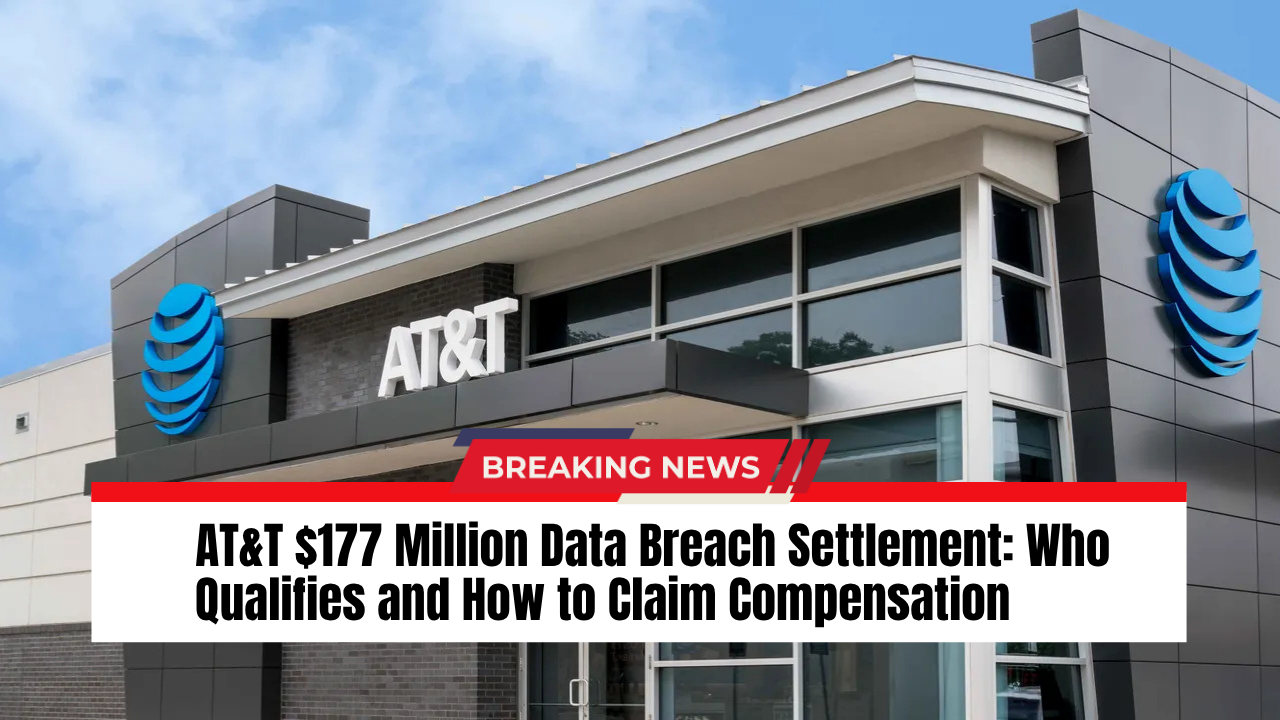Millions of Americans affected by AT&T’s massive data breaches could soon receive financial compensation following a federal court’s approval of a $177 million class-action settlement. The agreement comes after multiple lawsuits accused the telecom giant of failing to protect sensitive customer information from cyberattacks that compromised the personal data of more than 70 million people.
The settlement is one of the largest U.S. data privacy agreements in recent years, marking a critical step in accountability for corporate data protection practices. It reflects the growing legal pressure on telecommunications and tech firms to safeguard consumer information amid rising cybercrime.
The Background: Two Major Data Breaches
The lawsuits stem from two major breaches — one in March 2024 and another in July 2024 — that exposed the personal information of both current and former AT&T customers.
In the March incident, hackers reportedly accessed names, addresses, phone numbers, and account details belonging to approximately 7.6 million current and 65 million former customers. Cybersecurity analysts later discovered that the compromised data had been circulating on the dark web for months before AT&T confirmed the breach.
The second breach, in July, involved the unauthorized download of roughly 109 million call records stored in a cloud platform. These records contained data such as customer account IDs, call timestamps, and partial Social Security numbers.
The company faced widespread criticism for the delay in notifying customers and for alleged weaknesses in its data security systems. Regulators and advocacy groups, including the Federal Communications Commission (FCC), began monitoring AT&T’s data practices following the incidents.
What the Settlement Offers
The $177 million settlement covers all individuals whose personal data was compromised in either breach. According to court filings, AT&T did not admit wrongdoing but agreed to the settlement to “avoid further litigation costs and provide timely relief” to customers.
| Settlement Details | Description |
|---|---|
| Total Settlement Amount | $177 million |
| Estimated Eligible Users | 70+ million |
| Payout Range | Up to $5,000 (documented loss) / $2,500 (standard claim) |
| Claim Deadline | To be announced by the settlement administrator |
| Final Court Approval Date | June 20, 2025 |
Customers who can show documented financial losses directly linked to the breaches may qualify for payments of up to $5,000. Those unable to document specific losses can file a general claim for up to $2,500.
The settlement also provides for free credit monitoring and identity theft protection services for all affected users. These services will include fraud alerts, credit score tracking, and access to identity restoration assistance.
The court-approved administrator will soon release the official claim form and website where affected individuals can verify eligibility and file for compensation.
Legal and Industry Implications
The case highlights how cyberattacks are reshaping the legal landscape for corporations handling large volumes of consumer data. Telecommunications companies, in particular, are frequent targets due to the vast amount of personal and financial information they manage.
Following the breaches, AT&T committed to enhancing its cybersecurity systems, including stronger encryption protocols and cloud data monitoring. The company also pledged to work with the Federal Trade Commission (FTC) and Federal Communications Commission (FCC) to meet national data protection standards.
Experts say this settlement may influence future regulations on consumer data security, much like earlier cases involving Equifax and T-Mobile.
“Large-scale settlements like this one set a precedent for corporate accountability,” said cybersecurity policy analyst Dana Meacham. “They also encourage greater transparency about how companies detect, respond to, and report breaches.”
Several states, including California, New York, and Texas, have enacted new data privacy laws modeled on the California Consumer Privacy Act (CCPA), which gives residents greater control over how companies collect and share their data. Lawmakers continue to push for a unified Federal Data Privacy Law, though discussions remain ongoing in Congress.
How to File a Claim
While the settlement is approved, the claim submission process is expected to open once AT&T’s settlement website goes live later this year. Claimants will be required to:
- Provide proof of AT&T account ownership during the breach periods.
- Submit documentation of any financial or identity theft losses (for $5,000 claims).
- File a general claim form to receive up to $2,500 without documentation.
- Complete submission by the deadline once it’s announced.
Customers can also choose free identity protection services instead of a direct payout. The settlement administrator will contact eligible users by email or mail once the claims portal becomes available.
To ensure updates, consumers can check the Federal Trade Commission’s official consumer alerts page or AT&T’s privacy update section.
The Broader Impact
The AT&T breach underscores a national challenge: securing customer data in a rapidly digitizing world. As internet-based services expand, so does the risk of large-scale hacks exposing millions of records.
The Federal Highway Administration and other agencies increasingly rely on cloud systems and shared infrastructure — a reminder that even critical systems are vulnerable without proper safeguards.
Legal analysts believe AT&T’s settlement may serve as a model for future cases, setting benchmarks for both restitution and prevention efforts. Consumers affected by other corporate breaches, such as recent cases involving Apple and Clearview AI, could see similar compensation frameworks emerge.
Conclusion
The AT&T $177 million data breach settlement represents a landmark moment in consumer privacy enforcement. Eligible users may soon receive compensation of up to $5,000 or free identity protection for data exposed during the 2024 cyberattacks.
As cyberthreats evolve, the settlement signals a turning point in how major corporations are held accountable for safeguarding personal information. For millions of Americans, it’s both a warning and a win — emphasizing that data privacy is no longer optional but essential.



